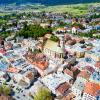
During the Seventeenth IAMC Annual Meeting, held online 4-6 November, the Integrated Assessment Modeling Consortium was proud to honor Marina Andrijevic (IIASA) with the Early Career Researcher Award for her contributions to the socioeconomic dimension of integrated assessment modeling, including her recent work on adaptive capacity.
Marina Andrijevic, a researcher in the Integrated Assessment and Climate Change Research Group of the IIASA Energy, Climate, and Environment Program, was awarded the prize for her fundamental and outstanding contributions to understanding and developing socioeconomic drivers for use in integrated assessment and global change research. This includes work on national Shared Socioeconomic Pathways (SSP) projections for socioeconomic drivers such as governance and gender, which are widely used in the integrated assessment (IAM) community and beyond.
She has subsequently led thinking on the importance of accounting for differentiated adaptive capacity, for people, sectors and institutions, and the importance of integration in IAM scenarios. This is demonstrated in a recent Nature Climate Change paper titled Towards scenario representation of adaptive capacity for global climate change assessments, which illustrates a framework for developing adaptive capacity scenarios and integrating them into broader global climate scenario frameworks and processes.
Ultimately, these contributions pave the way for improved linkages between IPCC Working Group (WG) II and WG III, enabling more integrated assessments of impacts, mitigation and adaptation, a critical frontier of IAM research.
Her contributions have broadened the scope of the IAM community into new areas of research and have been instrumental in bridging the gap with social science communities, a component of integrated assessment modeling that has long been difficult to address.
"I am deeply honored to receive this award and proud that my research has been recognized as a contribution to understanding the complexities of socioeconomic systems related to climate change adaptation and mitigation. The IAMC is a community that generates some of the world’s most policy-relevant research on climate change, with a core priority of advancing work on the intertwined challenges of climate change and inequality. This award is a wonderful encouragement for me to keep moving forward in this direction," says Andrijevic.
Recently, she also led the development of the SSP Extensions Explorer, a website that curates socioeconomic extensions to the SSP drivers to enrich the representation of socioeconomics in global change research.
Reference
Andrijevic, M., Schleussner, CF., Crespo Cuaresma, J. et al. (2023) Towards scenario representation of adaptive capacity for global climate change assessments. Nature Climate Change DOI: 10.1038/s41558-023-01725-1
News

11 March 2025
IIASA provides insights on research, technology, and innovation to Austrian federal states

05 March 2025
Project UPSTArt: Understanding Perceptions on Sustainability Transitions - from empirical research to participative Art-based approaches

06 February 2025

